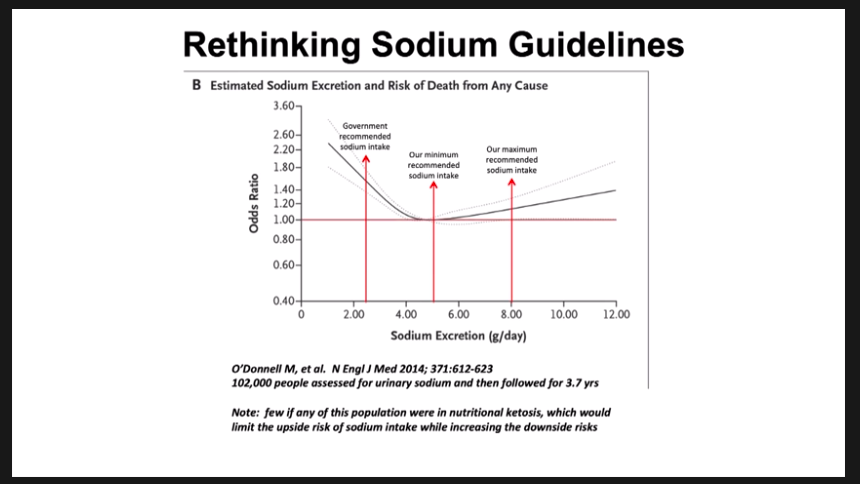Here’s another item from the “(almost) everything we’ve been taught about diet is wrong” department.
Experts say we should limit sodium intake to 2.3g per day to prevent high blood pressure.
Some people do have sodium-sensitive hypertension, and for them it makes sense to limit salt.
But they are a distinct minority.
This graph tells why:

I took this screen shot from the video below, which I’ve cued to start where Dr. Stephen Phinney is explaining this study.
But before you watch it, let me spell it out for you.
It’s from a study published in 2014 in the New England Journal of Medicine of nearly 102,000 people in 17 countries. You can download the paper to read it for yourself.
The chart shows risk of death or a major cardiovascular event like a heart attack or stroke as it relates to the amount of sodium excreted in the urine.
As Dr. Phinney describes it, the amount of sodium you pee first thing in the morning is well correlated to the amount of your daily sodium intake.
The 1.00 level in the middle of the y-axis shows baseline risk of death, and as you can see it’s a U-shaped curve. Sodium intake of about 5g per day is associated with the lowest risk. Two key points:
- If you have a higher sodium intake (right of the middle red arrow), your risk is higher.
- If you have a lower sodium intake (left of that arrow), your risk also is higher.
We’ve all heard about the danger of too much sodium.
I’ll bet you didn’t know the risk of death or major cardiovascular event from having too little sodium (#2) is even worse.
Or that the true “sweet spot” for lowest mortality and cardiovascular event risk is about twice as high as the current dietary guidelines.
Amirite?
If you think your friends might find this post helpful, I hope you’ll share by email or on your social networks using the buttons below.
To get these updates on a regular basis you can subscribe by email, or follow me on Facebook, Twitter and LinkedIn, where I’ll also be posting links.
Check out My Health Journey for the full story of our health improvements, and my #BodyBabySteps for an approach to how I would do it if I were starting today, based on what I’ve learned.